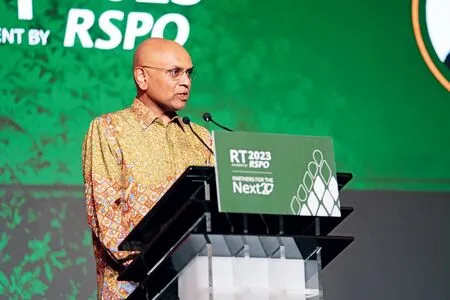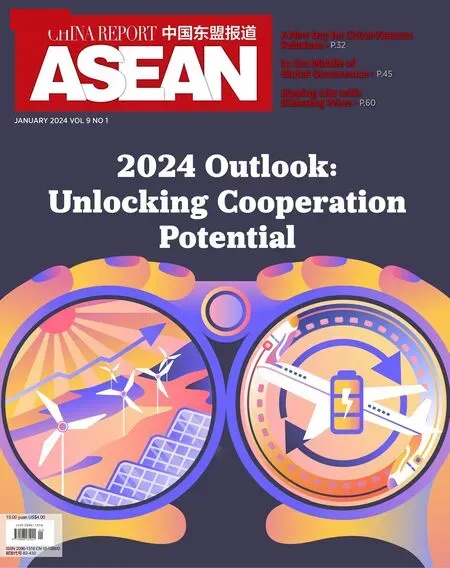Celebrating 20 Years of Progress
By Huang Jiangqin
RSPO to release revised global standards for sustainable palm oil

Constituting 40 percent of the total palm oil production in major producing countries,smallholders were the focus of RT2023. (COURTESY OF RSPO)
The Roundtable on Sustainable Palm Oil(RSPO) held its annual conference (RT2023) in Jakarta,Indonesia,from November 20 to 22,2023.Themed “Partners for the Next 20,” the meeting highlighted what RSPO’s members and partners have achieved over the last two decades.Nearly a thousand delegates from the global sustainable palm oil industry held discussions on the core challenges facing the industry including mitigating climate change,increasing uptake of certified sustainable palm oil(CSPO),protecting labor rights,and facilitating greater smallholder inclusion in green supply chains through compliance with emerging international regulations.
Established in 2004,the RSPO is an international non-profit organization that unites stakeholders from the palm oil industry.It is committed to promoting the growth and use of sustainable oil palm products through facilitating supply chain cooperation and dialogue between stakeholders.Members of RSPO and participants hail from different backgrounds including plantation companies,manufacturers,and retailers of palm oil products as well as environmental and social NGOs,all originating from countries producing or using palm oil.
“Through nearly two decades of voluntary action,RSPO members have banded together to raise the bar of sustainability within the industry,”said RSPO CEO Joseph D’Cruz in his opening remarks at RT2023.“The impact we have collectively achieved is increasingly being acknowledged by stakeholders outside our industry,and we are seeing a definite shift in the sustainable palm oil narrative in our favor.”
For the nearly 20 years of its operation,the RSPO has facilitated global change to make the production and consumption of palm oil sustainable.Its membership has grown from 200 members from 16 countries in 2004 to now more than 5,700 members in over 100 countries and territories.
Significant achievements of the RSPO over the past 20 years were announced at RT2023: The global certified area has increased from 125,000 hectares in 2008 to 4.9 million hectares across 23 countries;Certified Sustainable Palm Oil (CSPO) supply has reached 15.4 million metric tons;and its trademark licenses have increased sharply to more than 1,600 in over 100 countries and territories,with particular growth in China,Japan,and Southeast Asia.
As the third largest consumer of palm oil in the world,China shoulders a key role in driving market demand for sustainable palm oil and greening the global value chain.Chinese member companies in RSPO number 348,which consume nearly 500,000 metric tons of CSPO annually,a testament to great progress in both market awareness and corporate sustainability practices.“Promoting the green and low-carbon development of bulk soft commodities including palm oil can help China achieve its dual-carbon goals,” said Lin Hui,a researcher at the Institutes of Science and Development under the Chinese Academy of Sciences,when addressing the session themed“Shaping the Next 20: Synergizing Policies and Strategies for Sustainable Palm Oil.”
“As a global partnership to make palm oil sustainable,we must ride this trajectory and continue to evolve and pursue new territory,” Joseph D‘Cruz remarked.He revealed that the RSPO launched a Certification,Trade and Traceability System (CTTS)in October with the formation of a tripartite consortium of global agricultural technology experts.The system aims to meet current demand and anticipate the future needs of a sector that is rapidly evolving to meet tightening global regulations,starting with the EU Deforestation Regulation (EUDR),and actively engage with all stakeholders for knowledge-sharing on this topic.

Chief Executive Officer of RSPO Joseph D’Cruz delivers a speech at the opening ceremony.(COURTESY OF RSPO)
“There is now room for us to move beyond a standard and certification system and develop tools that would enable the industry to demonstrate sustainability in the way that markets,regulators and customers demand today,” D‘Cruz added.
“Formulating science-based policies that promote sustainable development of palm oil worldwide is of paramount importance,” Lin Hui opined,suggesting establishment of international cooperation mechanisms between palm oil producing and consuming countries including green production and investment policies for origin countries and green consumption and trade policies for consuming countries.Additionally,a transparent and traceable supply chain for sustainable palm oil should be established through the latest technologies and digitalized solutions.
Anne Rosenbarger and José Roberto Montenegro,co-chairs of the RSPO Board of Governors,together called for the successes of the past 20 years to be leveraged and scaled further through collective action and innovative approaches.“RSPO is strategically evolving to meet current and forthcoming challenges including shifting regulatory and market expectations by improving the auditability and implementability of our current standards and Assurance systems in order to be ready to connect to the broader industry’s sustainability platforms,” said Anne Rosenbarger.
It was reported that following a comprehensive and highly consultative review of 2018 RSPO Principles and Criteria and 2019 RSPO Independent Smallholder Standard,a technical revision process is underway to produce a new set of standards in 2024.

